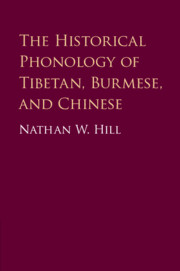Book contents
- The Historical Phonology of Tibetan, Burmese, and Chinese
- The Historical Phonology of Tibetan, Burmese, and Chinese
- Copyright page
- Dedication
- Epigraph
- Contents
- Figures
- Note on Abbreviations and Conventions
- Book part
- Introduction
- 1 Tibetan
- 2 Burmese
- 3 Chinese
- 4 Trans-Himalayan
- Appendix: Complete Lists of Examples
- References
- Index Verborum
- Index Rerum et Nomum
- Index Legum
Introduction
Published online by Cambridge University Press: 22 July 2019
- The Historical Phonology of Tibetan, Burmese, and Chinese
- The Historical Phonology of Tibetan, Burmese, and Chinese
- Copyright page
- Dedication
- Epigraph
- Contents
- Figures
- Note on Abbreviations and Conventions
- Book part
- Introduction
- 1 Tibetan
- 2 Burmese
- 3 Chinese
- 4 Trans-Himalayan
- Appendix: Complete Lists of Examples
- References
- Index Verborum
- Index Rerum et Nomum
- Index Legum
Summary
The goal of this work is to present the sound laws relating Tibetan, Burmese, and Chinese, and to reconstruct the linguistic unity from which these three languages descend, so far as current knowledge permits. Tracing the development of etyma from their primitive origins into the living tongues of today would bring the narrative satisfaction of accompanying a hero through his struggles, but it is dishonest to present historical phonology as the trials of reconstructed forms progressing through sound changes towards an ultimate destiny in history. The end of this journey, the attested corpus of related languages, is fixed, but the original linguistic unity is the protean and mercurial product of research. Rather than presenting reconstructions picked out of the air and discussing their development, I present sound changes in reverse chronological order. I subsequently reiterate these sound changes in chronological order, so that, after seeing how the reconstructions are arrived at, one can see how it is that the reconstructed forms become the attested forms.
- Type
- Chapter
- Information
- Publisher: Cambridge University PressPrint publication year: 2019



